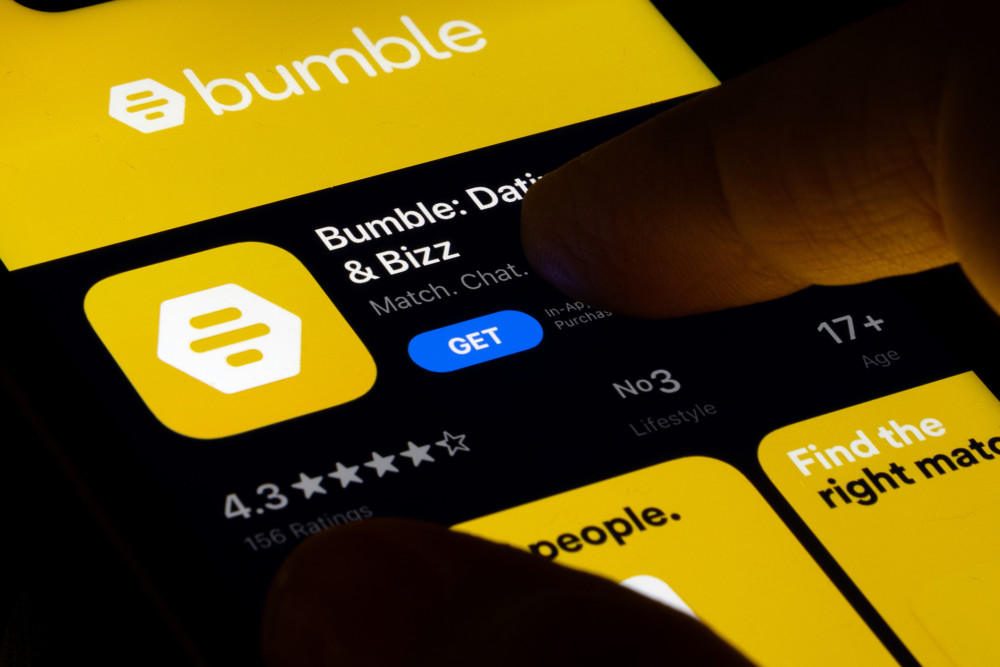Kara Carlson
Austin American-Statesman
WWR Article Summary (tl;dr) As Kara Carlson reports, “In just seven years, the company has grown to more than 100 million users, and today, Wolfe Herd, now 31, might be a billionaire based on her stock holdings in the company after it went public Thursday.”
TNS
When Whitney Wolfe Herd started Bumble in 2014, it would have been hard to imagine that less than seven years later, the startup would have turned into a multibillion-dollar powerhouse.
Wolfe Herd was just 25 when she created Bumble in December 2014, basing it on the idea of building a more women-centric and women-friendly version of Tinder, where she previously was vice president of marketing.
Bumble operates similarly to apps like Tinder, where users swipe left or right on preferences. However, Bumble only allows women to initiate a conversation or contact.
In just seven years, the company has grown to more than 100 million users, and today, Wolfe Herd, now 31, might be a billionaire based on her stock holdings in the company after it went public Thursday.
The company made a stunning debut on Wall Street, raising $2.15 billion with its initial public offering of stock, and saw shares soar more than 80% in the early minutes of trading.
Bumble has expanded from its dating-focused roots into a women-centric social networking platform that includes friend and business networking options. The company’s apps, Bumble and Badoo, have more than 40 million monthly users, and more that 2.4 million paying users in more than 150 countries.
In a securities filing before the company went public, Wolfe Herd said she expects Bumble to become a “preeminent global woman’s brand” and a place to meet new people “no matter who you might be looking for, whichever life stage or relationship you’re in.”
Wolfe Herd started Bumble in part at the urging of Russian-British billionaire Andrey Andreev. He started Badoo in 2006 and backed Bumble in 2014. At the time, Andreev was the founder of MagicLab, the parent of the company of Badoo and Bumble that was later renamed Bumble. The company has since grown to hundreds of global employees.
Amber Gunst, CEO of the Austin Technology Council, said Bumble has had an impact beyond that of other dating apps.
buy prednisone generic https://infoblobuy.com/prednisone.html over the counter
“Bumble didn’t just create a dating app. They created a social movement that was around a safe environment for women to go out and meet a potential significant other,” Gunst said.
The app has been able to market itself as a more safe, secure and relationship-focused option than other apps. The company has added a number of features over the years focused on safety and personalization such as verification.
Scott Kesler, global sector lead for technology media and telecommunications at New York-based Third Bridge, said Bumble was able to jump in and compete so quickly, in part because it was built with the help of Badoo’s infrastructure. Kelser said the company’s focus on technology and innovation has given it a competitive advantage as it rolls out new features and functionality.
By 2016, the company was already starting to expand beyond just its dating app roots, launching Bumble BFF, a similar concept to the dating app, but geared towards friendship. In 2017, it launched a networking focused, Bumble Biz.
“When they first came out, it was this small little thing that I think just was slowly gaining speed,” Gunst said. “I worked with a lot of single young women, and they were like, ‘Oh, you got to check this out,’ and then the single young guys that I worked with, were also checking it out. I was watching how people were adapting to it and how they were adopting it. Now I’m seeing these folks years later, and they’re settling down, they’re getting married, they’re still using it to find friends. They’re using it to build business relationships with people who are local here in Austin.”
It’s features like those that are “the real secret sauces” for Bumble’s long-term sustainable growth, said Mukul Krishna, an analyst and Global Practice Head of Digital media at San Antonio-based business consulting firm Frost and Sullivan.
He said the company’s commitment to safety especially for women and the LGBTQ community also keep users from being driven away.
In 2019, the company acquired Chappy, a dating app for gay men. It now operates out of Bumble headquarters.
Despite Bumble’s aspirations of being more of a holistic relationship company, it still is making most of its revenue from the dating side of the app, Kelser said. The app generates revenue through a subscription model, which has free features and charges for additional services.
Bumble President Tariq Shauka said the company is actively growing features to go beyond just matchmaking and to respond to what users need.
“We’re not here to just have you matched with a number of people. What we’re here to do is to help you get into good conversations, to get to know people, find somebody or find a group of friends or whatever it is that you’re looking for, and really have that deep connection,” he said.
Shaukat said that as Bumble looks to the future, it sees a wealth of opportunity still ahead of it.
“We think we’re still in the in the early innings of this on the dating side. There’s a lot more opportunity than we can capture in our core markets — here in the U.S. and the UK, Australia, markets like that — but we actually think that we’re seeing phenomenal demand around the world for both Bumble and Badoo,” Shaukat said. “A lot of what’s on the roadmap is continuing to serve users here to expand globally we are seeing great traction in places as far-flung as Mexico, Germany and India. It really proves that the mission and the vision and the product and the value proposition work on a global basis.”
Distributed by Tribune Content Agency, LLC.














































































































































































































































































































































































